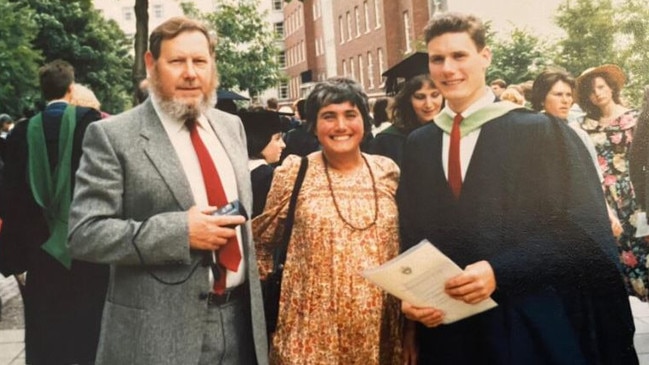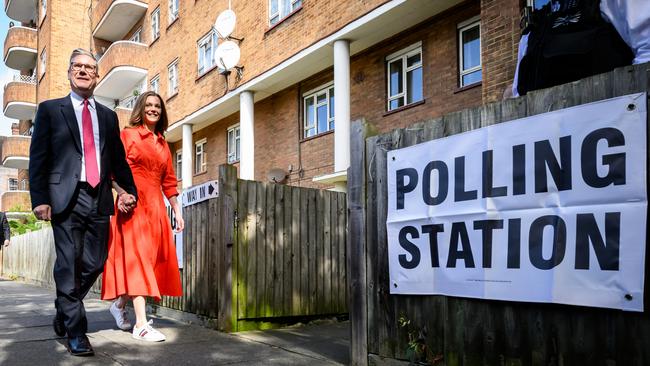Who is Britain’s new Prime Minister?
He’s already got a knighthood but just don’t call him “Sir” – this is the man who is Labour’s first UK Prime Minister for 14 years.
World
Don't miss out on the headlines from World. Followed categories will be added to My News.
Usually, British politicians are knighted after their time in high office.
Becoming a “Sir” or “Dame” is a reward for many years of political service.
Take Sir Tony Blair or Sir John Major for instance, who were knighted after their stint in Downing Street.
Yet Britain’s new Prime Minister, Keir Starmer, is a Sir even before being appointed to the top job.
No mean feat for a man who was once almost arrested for illegally selling icy poles.
But you will rarely see him use the term Sir himself and it doesn’t even appear on his profile on the Labour Party’s website.
On Friday, Sir Keir Starmer will walk through the famous black Downing Street door in central London after being officially given the role of PM by King Charles III at Buckingham Palace.
He will become the first Labour Prime Minister of the UK for 14 years.
Mr Starmer will replace Rishi Sunak who led his Conservative Party to a drubbing at the polls on July 4.

Mr Starmer has run a disciplined, and relatively dull, campaign.
After a decade and a half of Conservative rule, Brits were tired of the Tories – as they are known – and the chaos that engulfed it. Not the least of which was the prime ministership of Liz Truss that lasted just weeks.
All Mr Starmer had to do was keep his head down, not scare off the voters, and the keys to Downing St were his.
But it’s meant that Mr Starmer has been something of an enigma.
Starmer ‘didn’t talk’ to his dad
Born in 1962, in Southwark, next to the River Thames in London, he is the son of a nurse and toolmaker.
He grew up in the leafy town of Oxted, in Surrey in England’s south east, where most people vote Conservative.
But the family were Labour through and through.

Mr Starmer’s unusual first name reportedly came from Keir Hardie, one of the founders of the party. Although Mr Starmer has said his parents never confirmed that.
Mr Starmer’s relationship with his mother was close and he has praised the publicly funded National Health Service for helping her through her chronic battle with Still’s disease, an auto inflammatory condition.
But he was distant from his father, who he said was a “complicated man” who looked down on Oxted because he worked in a factory.
“We didn’t talk. He never really expressed pride in what I did. He certainly didn’t say, ‘I love you,’” he told Britain’s Virgin Radio.

Near arrest over ice cream
Mr Starmer joined the Young Socialists at 16 and studied law at the University of Leeds where he graduated with first class honours. He then studied law at Oxford.
In a bizarre incident he was almost arrested by the French police.
When he was a student he went to the south of France with the intention of making some summer cash by selling ice creams to tourists.
“We spent a month … as almost beach bums, selling ice-creams to tourists, and making about four francs a day,” his student friend John Murray told website Politico.
“And then we found out it was actually not legal. So we spent our time kind of avoiding being arrested.”
Mr Murray was indeed arrested but all he would say was the young Mr Starmer “had his ice-creams confiscated”.

Macca's case
In 1987, Mr Starmer became a barrister and served as the campaign officer for human rights group Liberty.
In a notable case, Mr Starmer provided free legal advice for two people being pursued by fast food giant McDonalds.
In what became known as the “McLibel” case, Macca’s brought libel proceedings against five Greenpeace supporters after they published a leaflet accusing the firm of paying low wages and abusing animals.
McDonald’s won after a mammoth 10 year battle but it was a Pyrrhic victory as the allegations were cited again and again in court and on the news.

Health worker wife
It was while he was a barrister, he met health worker Victoria Alexander who he married in 2007.
They have two children, a son and a daughter.
He is an atheist, a pescetarian (eats fish but not meat) and supports London football club Arsenal. Mr Starmer was once a republican but now appears to be more at ease with a monarchy.
He lives in Kentish Town, not far from where former PM Tony Blair used to live, just a few kilometres away in Islington.
In 2008, he was named as the head of the Crown Prosecution Service (CPS), which prosecutes criminal cases in England and Wales. He was also named as Director of Public Prosecutions.
It was a high profile role that brought focus on to Mr Starmer. During his time the CPS prosecuted several politicians, including Labour MPs.
He also oversaw the prosecution of the killers of Stephen Lawrence, a black man, by several men in a racially motivated attack.
“I’m proud to have helped bring his killers to justice — we must do more to rid racism from our society,” he said.

Don’t call me ‘sir’
It was for his service at the CPS that the then Prince Charles knighted him in 2014 making him Sir Kier Starmer.
But Mr Starmer rarely uses the “Sir” himself.
Despite a spectrum of Brits having been given the title, it still reeks of the British elite.
It’s perhaps a bit awkward that a man leading a party founded to represent the working class has a knighthood.
In 2015, Mr Starmer moved from administering the law to making it by becoming the MP for the electorate of Holborn and St Pancras in north London.

The same year, Jeremy Corbyn became leader of the Labour Party. While both Mr Corbyn and Mr Starmer may have had socialist roots, Mr Corbyn had remained on the far left of the party.
Labour lost the 2017 and 2019 general elections which some blamed the losses on Mr Corbyn.
Mr Starmer was sounded out as a more centrist leader. In 2020, he took the helm of the party.
The win for Labour in the election is partly to do with an apathy for the Conservative Party and a desire for change.
But Mr Starmer’s Labour hasn’t promised any major moves, for fear of ratting voters.
Rather, he has said, he wants to get the UK Government functioning properly once more.
“Keir Starmer faces a very acute dilemma,” a Conservative member of the House of Lords told the US’ National Public Radio.
“Expectations of big change are running very high. But his policy list is modest and cautious.
“Expectations are running far ahead of what he can actually do”.
Originally published as Who is Britain’s new Prime Minister?



